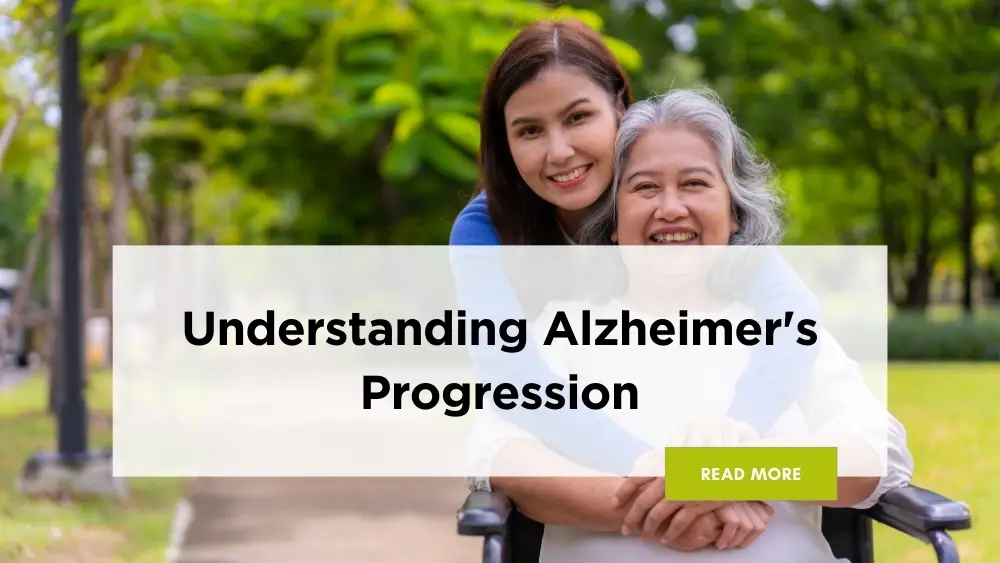Alzheimer’s progression is a gradual process that affects memory, cognitive function, and daily living. It starts subtly—misplaced keys, forgotten names—but over time, it evolves into significant cognitive decline. The way Alzheimer’s progresses varies from person to person, making it essential to understand its stages for better care planning and support.
Why Recognizing Alzheimer’s Stages Matters
Caring for a loved one with Alzheimer’s isn’t just about providing assistance—it’s about adapting to their evolving needs. Knowing what to expect at each stage allows families and caregivers to create a personalised care plan for Alzheimer’s, ensuring safety, comfort, and dignity at every step. Whether it’s adjusting routines, providing emotional support, or seeking professional Alzheimer’s care, understanding the disease’s progression helps in making informed decisions.
What Influences the Speed of Alzheimer’s Progression?
You may wonder, “how quickly does Alzheimer’s progress?” The truth is, there’s no single answer. Several factors can influence the speed of progressive Alzheimer’s dementia, including:
- Age at Diagnosis – Early-onset Alzheimer’s tends to progress faster than cases diagnosed later in life.
- Overall Health – Underlying conditions like heart disease or diabetes can accelerate cognitive decline.
- Lifestyle Choices – A brain-healthy diet, regular exercise, and mental stimulation may slow progression.
- Genetics – Family history plays a role, though lifestyle and environment also contribute.
While there’s no cure, early recognition and the right support can make a difference in how individuals and families navigate this journey.
Early Stage: Mild Alzheimer’s Symptoms

The early signs of Alzheimer’s progression can be subtle, often mistaken for normal ageing. Forgetfulness, trouble finding words, and minor confusion—such as getting lost in familiar places—may start to appear. While independence is still possible, decision-making and social interactions can become challenging.
Supporting your loved one with routines, memory aids, and a brain-healthy lifestyle can help manage symptoms. Patience and reassurance are essential, as mood changes and frustration may arise. This is also the best time to discuss care plans for Alzheimer’s, ensuring future legal, financial, and care arrangements are in place. Acting early can improve quality of life and slow progression.
Middle Stage: Moderate Alzheimer’s Symptoms
As Alzheimer’s progression advances, memory loss worsens, and daily life becomes more challenging. Individuals may forget personal details, struggle with problem-solving, and experience mood swings, including irritability and confusion. Wandering, repetitive speech, and withdrawal from social activities can also occur, increasing safety concerns.
At this stage, Alzheimer’s care must be more structured. Families may need to assist with hygiene, meals, and medication while maintaining a stable and supportive environment. Clear routines, simple communication, and a secure home setup can help reduce distress and preserve dignity.
Late Stage: Severe Alzheimer’s Symptoms
In the final stage of Alzheimer’s progression, cognitive and physical decline become severe, requiring full-time care and support. Key challenges include:
- Major Cognitive Decline – Loss of recognition of loved ones, inability to communicate, and complete dependence on caregivers.
Loss of Communication Abilities – Speech becomes limited or non-existent, with individuals relying on facial expressions and body language. - Physical Changes – Difficulty swallowing, loss of mobility, weight loss, and increased risk of infections.
- Challenges in Caregiving – Assistance is required for all daily activities, including eating, dressing, and personal hygiene.
- Need for Full-Time Care – Families often seek professional Alzheimer’s care to ensure safety and well-being.
- End-of-Life Considerations – Prioritising comfort, dignity, and pain management, with discussions around hospice or palliative care.
At this stage, ensuring a care plan for Alzheimer’s that focuses on compassionate, round-the-clock support is essential in maintaining the individual’s quality of life.
How to Support a Loved One Through Alzheimer’s Progression
Caring for someone with progressive Alzheimer’s dementia requires patience, planning, and a compassionate approach. As the disease advances, adapting to their changing needs becomes essential. Here are key ways to provide support:
- Create a Safe and Comfortable Home Environment – Reduce fall risks by removing tripping hazards, installing grab bars, and ensuring good lighting. Use labels, reminders, and simple layouts to help with navigation and familiarity.
- Consider Professional Caregivers and Memory Care Services – As Alzheimer’s progression continues, professional caregivers can provide essential support, from personal care to specialized Alzheimer’s care services. Memory care facilities offer structured routines, therapeutic activities, and 24/7 supervision for advanced stages.
- Offer Emotional Support for Families and Caregivers – Watching a loved one decline is emotionally challenging. Seeking support from Alzheimer’s caregiver groups, therapy, or respite care can help manage stress and prevent burnout. Prioritising self-care allows caregivers to continue providing compassionate and effective support.
Providing care is not just about meeting physical needs—it’s about maintaining dignity, comfort, and emotional well-being throughout the journey.
Planning for the Future
As Alzheimer’s progression continues, planning ahead ensures the best care while easing emotional and financial stress. Legal and financial preparations, such as drafting a power of attorney and exploring long-term care options, help protect a loved one’s wishes. Families must also decide between in-home Alzheimer’s care, which offers familiarity, or assisted living for 24/7 support. Caregiver resources and support groups provide guidance and emotional relief, helping families navigate the journey with confidence. Taking proactive steps ensures dignity, comfort, and quality care at every stage.
Navigating Your Loved One’s Alzheimer’s Journey

Caring for someone with Alzheimer’s progression is an emotional and ever-changing experience. From early memory slips to full-time care needs, each stage presents new challenges, but with the right approach, you can provide comfort and stability. Recognising the signs early, creating a safe and familiar environment, and considering professional Alzheimer’s care can help maintain their quality of life.
Support groups and caregiver resources offer guidance and reassurance when you need it most. While this journey is difficult, planning ahead ensures your loved one receives the dignity and care they deserve. Remember, you’re not alone—help is always available.
Get the Support You and Your Loved One Deserve
Caring for a loved one with progressive Alzheimer’s dementia can feel overwhelming, but you don’t have to navigate it alone. Whether you’re seeking advice, in-home support, or memory care solutions, our team is here to help. Let’s create a care plan for Alzheimer’s that ensures comfort, dignity, and peace of mind at every stage. Connect with our Alzheimer’s care experts today—because compassionate, professional guidance can make all the difference.
At Live-in Care Angels, we understand the challenges of Alzheimer’s care and are committed to providing personalised, round-the-clock support. Our experienced caregivers offer compassionate, specialised care tailored to each stage of the condition. Reach out to us today at 0330 043 6436 or email info@liveincareangels.uk to discuss how we can help your family with expert live-in care.

